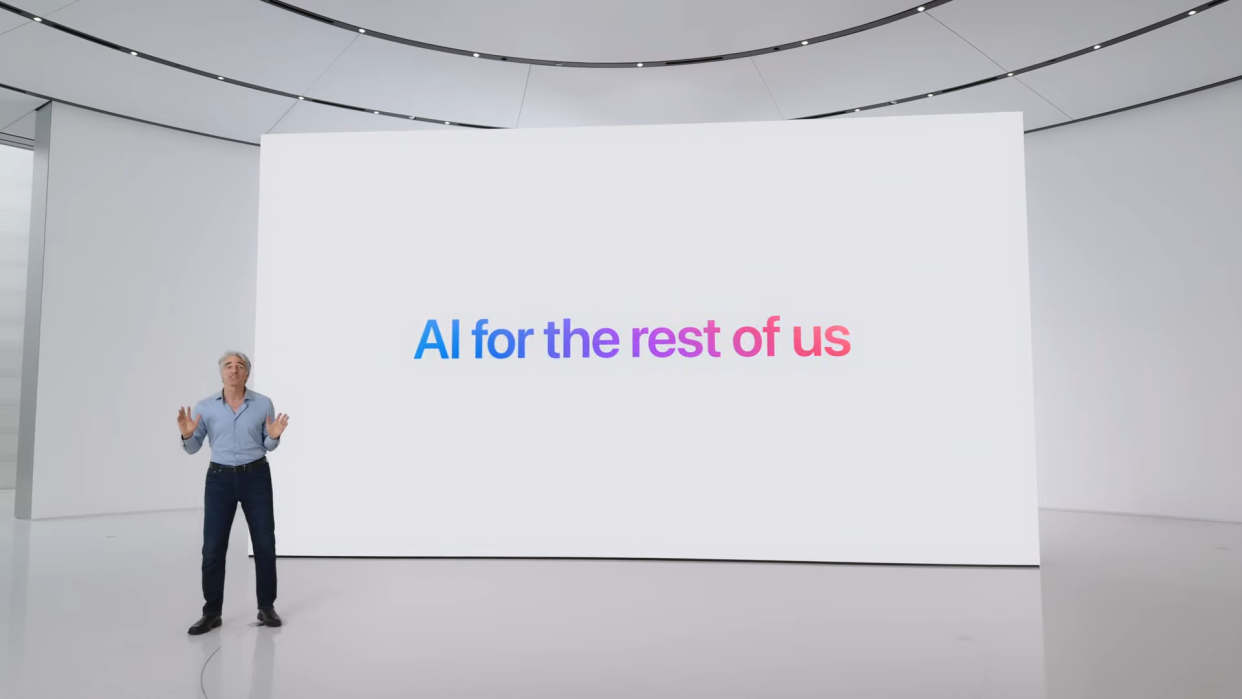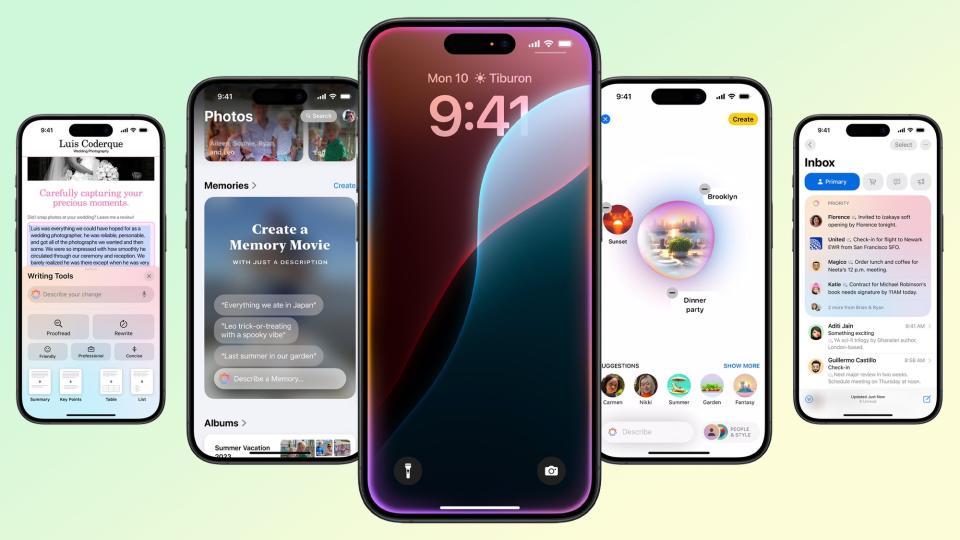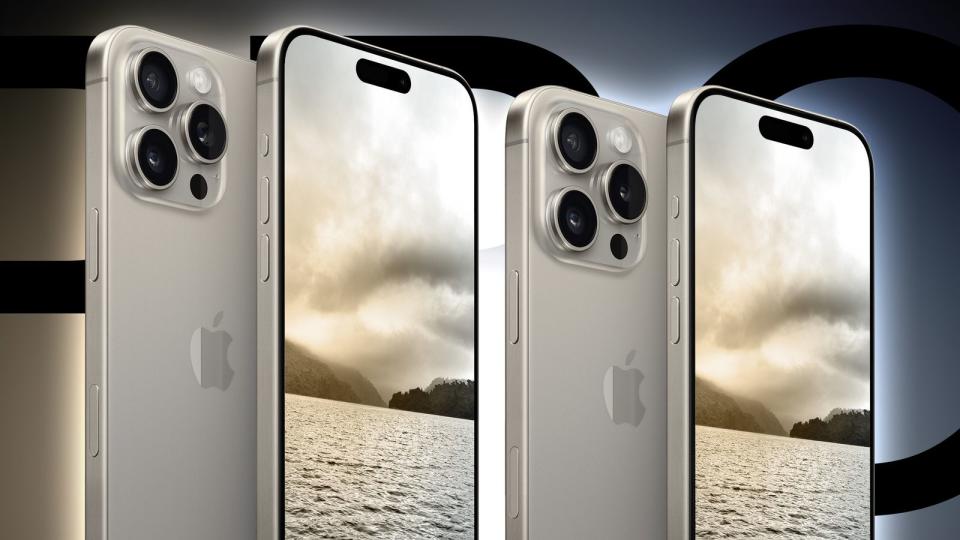Apple Intelligence is leaving hundreds of millions of iPhone owners out in the cold — here’s why

Update: Apple's revealed more about the hardware requirements for Apple Intelligence that means older iPhones won't run it properly.
Toward the end of Apple's WWDC 2004 keynote, as Apple was wrapping up its segment on the new Apple Intelligence feaatures, senior vice president of software engineering Craig Federighi stood in front of a graphic that said "AI for the rest of us." While it was a nice shoutout to the original Mac slogan — "a computer for the rest of us," in case you've forgotten — it may have been more accurate to say "AI for the rest of us... though probably not you."
That's a reflection of the Apple Intelligence system requirements, which are a bit restrictive, especially on the iPhone. While iOS 18 will work on devices released and 2019 and later, Apple Intelligence features on the iPhone are compatible with Apple handsets dating all the way back to... nine months again. And even then, not every iPhone released last fall can join the party.
Specifically, Apple Intelligence will require either an iPhone 15 Pro or iPhone 15 Pro Max. The iPhone 15 and iPhone 15 Plus released at the same time don't have the necessary processing power to support these new capabilities.
So if you're like me and you're using an older iPhone — and not even one that's all that old in the case of the iPhone 14 or iPhone 15 — you can't help but feel a little deflated by the very end of Apple's keynote.
Yes, Apple Intelligence sounds promising — the new Siri may be worth the price of admission, and I'd be interested to see if the promised writing and imaging tools fit into my workflow (or better yet, improve it). But unless one of two specific iPhone models falls into my lap in the next little while, those features are beyond my reach.
Apple looks forward with Apple Intelligence

Apple's hands are tied here, to a certain extent. Faced with the choice of offering a diminished product or making sure its foray into AI delivered greater value even at the expense of cutting off more users, it opted for the latter approach. And as gifted as the engineers Apple has hired, they can't go back in time and bolster the neural capabilities of the iPhone 13's system-on-chip. (By that same token, I'm not sure there was anyone twisting Apple's arm and forcing them to put A16 Bionic chips on the standard iPhone 15 last fall instead of more powerful A17 silicon that power the Pro models.)
Besides this speaks to Apple's vision for Apple Intelligence as a way of moving the company forward rather than ret-conning its current lineup with new features. Bloomberg's Mark Gurman put it more succinctly in his WWDC preview column a couple days ago: "The push into AI isn’t just about Apple’s current lineup — it will help enable a new generation of hardware products."
That's good news for Future Phil when it's time to buy the next Apple device, but Phil in his current iteration is finding that to be pretty thin gruel.
That may also be part of Apple's calculus here, as it's got new iPhones to sell in the fall. With all of those devices likely to feature A18 chips — yes, even the iPhone 16 and iPhone 16 Plus — that will expand the number of Apple devices capable of running Apple Intelligence features and give more people a crack at trying these new capabilities.
Apple Intelligence: Upgrade your iPhone or not?

I'm just not sure that I'll be among them, not just to make sure I have a device with Apple Intelligence support. While I'd love to give Apple Intelligence a go if my current iPhone supported it, I'm not ready to pay at least $799 — the rumored starting price of an iPhone 16 — for the privilege of testing things out.
Like I said earlier, there are some impressive new tools that are coming through Apple Intelligence, not the least of which is a smarter version of Siri able to better understand context. Features like assembling a photo gallery using a text prompt could be worth spending time with and since I really enjoy Magic Eraser when I use it on Pixel phones, I'm sure I'll enjoy doing the same thing with Apple's iteration of the same feature (which is called Clean Up.)
But I'd describe most of those capabilities as "nice to try," rather than "must have." And honestly, there are enough "must avoid" tools in Apple Intelligence that would put me off an upgrade until I find out more about how they work. Genmoji's a clever name, but I can't imagine a scenario on earth where I need to generate a custom-made emoji on the fly. And to paraphrase the late P.J. O'Rourke, I'd sooner hand over my car keys and a bottle of whiskey to teenagers than I would hand over my iPhone to OpenAI and its ChatGPT tool, which is going to be integrated into the new Siri.
I may be singing a new tune once Apple Intelligence lands in the hands of users who do have the supported devices and can detail more reliably on which of these features is a true game-changer. Of course, with reports that initial versions of the AI features could be quite buggy, it's possible that we may need some time to fairly assess Apple Intelligence — to the point where the likely iPhone 16 release date may come and go before a consensus verdict emerges.
I don't think the lack of wider device support for Apple Intelligence should undercut Apple's efforts to make its phones, tablets and Macs smarter. Ultimately, it's probably the wiser move for Apple to do things this way. But if you're feeling a lack of enthusiasm about some of the changes Apple announced — even as exciting as those changes could be — it's certainly understandable.
